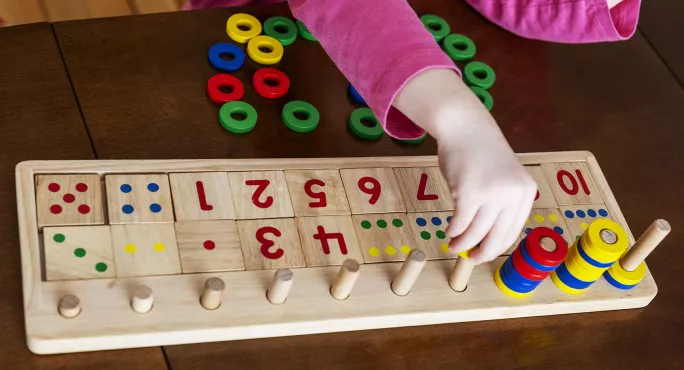
- Home
- Analysis
- Early Years
- Why early years CPD is the key to boosting maths attainment
Why early years CPD is the key to boosting maths attainment

The government’s Plan for Change sets out the bold target that by 2028 75 per cent of five-year-olds should reach a good level of development in the Early Years Foundation Stage (EYFS) assessment - an increase from 67.7 per cent today.
Achieving this would mean an additional 40,000 to 45,000 children each year reaching key developmental milestones, including foundational maths skills.
At the National Centre for Excellence in the Teaching of Mathematics (NCETM), this is a move we warmly welcome, as we believe all children can learn and enjoy maths.
Improving early maths education
If this goal is to be reached, though, we must start early in children’s lives. Research consistently shows the strong correlation between a good grasp of number sense at age 5 and later mathematical achievement.
The recent commitment of additional funding to train EYFS practitioners is therefore very welcome, while the curriculum review is another opportunity for the government to address the need for structured, research-informed approaches to developing strong number sense from the earliest years.
What’s more, thanks to extensive research, we know what high-quality early maths education looks like, both in terms of curriculum and pedagogy - something the NCETM and Maths Hubs have worked to translate into practice to support Reception teachers in embedding effective maths teaching in classrooms for over a decade.
- Primary curriculum: How to fix the primary maths curriculum
- Attainment: Gender gap in Year 9 maths at its widest
- Maths: In the AI age, numeracy is more important than ever - not less
This has helped us to refine models that help teachers to deepen their understanding of curriculum design and pedagogy - one of the most significant of which has been the Mastering Number programme, launched in September 2021 and fully funded by the Department for Education.
This programme supports teachers in applying a “teaching for mastery” approach to early number learning, from helping teachers to plan for whole-class sessions to developing activities in the wider provision, small-group work and embedding maths in classroom routines.
From feedback relating to the Mastering Number in Reception programme specifically, we know teachers are seeing the impact in their Reception classrooms, where maths is not confined to formal teaching but is embedded across continuous provision, emerging in children’s play, conversations and in how they make sense of the world around them.
Ofsted’s 2023 report Coordinating Mathematical Success highlights this as an example of good practice in early mathematics, recommending it be offered more widely:
“The NCETM’s Mastering Number programme was particularly helpful. In these schools, pupils were successful and received lots of praise. They were learning how to subitise (recognise a number of objects without having to count), understand numerical concepts and recall addition facts.”
From all this, we believe many of the principles underpinning Mastering Number in Reception could be applied to nursery settings, ensuring that children develop strong mathematical foundations to help them achieve their early learning goals (ELGs).
Importantly, guaranteeing that children encounter mathematical concepts across a variety of contexts helps to deepen their understanding - it is depth rather than coverage of learning that matters most.
By extending research-informed approaches into nursery settings, we could make a profound difference to children’s long-term success and ensure that every child, regardless of background, achieves their ELGs at the end of the Reception year and develops the number sense essential for future achievement.
CPD and training
To do this, a targeted focus on professional development for EYFS practitioners is critical. When educators understand typical learning progressions and have access to age-appropriate strategies, they can lay the mathematical foundations that drive attainment.
For this approach to succeed at scale, investment must go beyond funding alone, though.
Training must be genuinely accessible, ensuring that practitioners have the time and local opportunities to engage with high-quality professional learning that will develop their skills. Without this, the potential of early maths education will remain untapped.
Extensive research now informs our understanding of what high-quality early maths education looks like, both in terms of curriculum content and pedagogical approaches. With the right investment in professional development and a strategic commitment to implementation, we can deliver meaningful change.
By prioritising early maths education now, the government can accelerate progress in its Opportunity Mission, giving thousands of children the best possible start and unlocking their future potential.
Sue Evans is assistant director for primary at the National Centre for Excellence in the Teaching of Mathematics
For the latest education news and analysis delivered every weekday morning, sign up for the Tes Daily newsletter
You need a Tes subscription to read this article
Subscribe now to read this article and get other subscriber-only content:
- Unlimited access to all Tes magazine content
- Exclusive subscriber-only stories
- Award-winning email newsletters
- Unlimited access to all Tes magazine content
- Exclusive subscriber-only stories
- Award-winning email newsletters
You need a subscription to read this article
Subscribe now to read this article and get other subscriber-only content, including:
- Unlimited access to all Tes magazine content
- Exclusive subscriber-only stories
- Award-winning email newsletters
- Unlimited access to all Tes magazine content
- Exclusive subscriber-only stories
- Award-winning email newsletters



